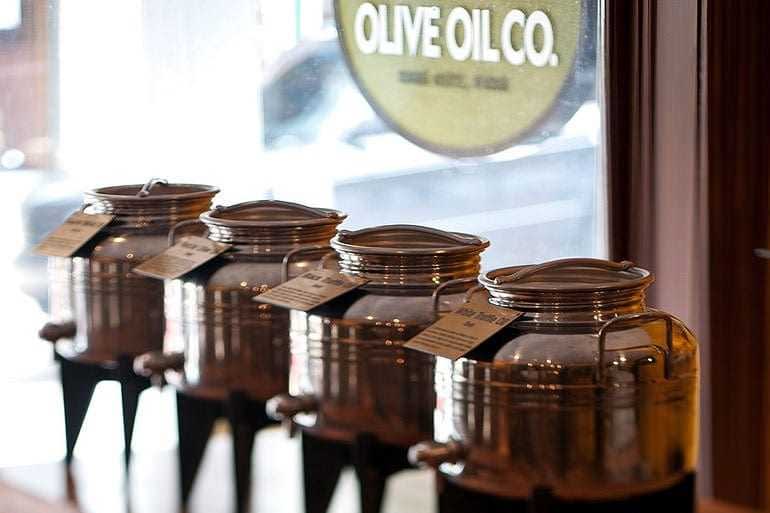Olive oil tasting bars may have originated in Europe, but their presence in the U.S. has been expanding rapidly over the past several years. There are estimated to be over one thousand such specialty stores and specially-equipped tasting areas in gourmet markets across the country. Instead of directly picking a bottle off a shelf, customers are able to sample oil “on-tap” (typically stored in traditional Italian containers called fusti) before making a purchase.
This thing’s gone full throttle. It would be very difficult to go back now.
“This thing’s gone full throttle,” asserted Veronica Bradley, CEO of Veronica Foods Company, when asked about the future of so-called ‘on-tap’ olive oil tasting. “It is the way forward, and I think it would be very difficult to go back now.”
Veronica Foods is one of several businesses currently supplying olive oil tasting bars within the United States. From their first store in Fish Creek, Wisconsin, the importer now works with over 600 locations, with more to come.
Bradley’s competition includes the Vom Fass and Oil & Vinegar franchises, which boast hundreds of stores around the world between them. Both companies were established in Europe before approaching the U.S. market. Another franchise, California-based olive oil retailer We Olive, opened its first East Coast store in Brooklyn last month.
Even as on-tap tasting bars have begun to take off in North America, health officials in the UK announced a ban on aspects of the practice in 2014. The Rural Payments Agency (RPA) cited the sale of unsealed olive oil as a breach of European regulations. In a later interview with Olive Oil Times, an official clarified that allowing customers to sample oil prior to purchasing a separate, sealed bottle was not a breach, but only if the contents of the bottle matched those of the sample exactly.
Randy Hernandez, former owner of Oliana Premium Olive Oil and Vinegars in West Hollywood, described the process of communicating with local health departments about his tasting bar as a trying one. Regulations on retail food sampling vary on a state-by-state basis in the U.S., he said, which could make obtaining a permit difficult. Hernandez was quick to emphasize, however, that Oliana’s recent closure was the result of leasing issues and not a lack of faith in the popularity of the product or tasting bars.

Mountain Town Olive Oil Co. in Park City, Utah
Critics of on-tap olive oil also raise questions about storage practices, and whether retailers can possibly keep their product fresh throughout the year. When asked how long oils might remain in a fusti before being exchanged, Veronica Bradley said it varied. Not all oil tasting bars are equal, Bradley acknowledged, and there have been attempts to use the popular on-tap tasting model to sell sub-par products. “We pay very particular attention to the chemistry of the oil. People lie, bottles lie, but chemistry doesn’t lie.”
Despite a number of similarities regarding how the product is served to customers at oil tasting locations, there are differences in operational choices between companies. Director of operations at Vom Fass, David Eisner-Kleyle, credits advanced packaging technology with the freshness of their on-tap oil, allowing the quality of the fruit to be “frozen in time,” he said. Containers, once sealed, are never opened to transfer their contents, potentially exposing them to light or oxygen, Eisner-Kleyle said.
But are olive oil tasting bars the kind of business that Americans have an interest in frequenting? Locations have cropped up across all the largest metropolitan areas of the country, but what about the small towns and cities?
SEE ALSO: Retailer Gets His Day in ‘Shark Tank’
Some have argued that the prices in such specialty shops, which can be as high as $60 per liter, are more in line with an extravagant souvenir than a daily staple, and it’s no wonder the shops tend to be in tourist-centric locations.
Eisner-Kleyle is confident that the model can work in either an urban or rural setting, and believes that quality is a better indication of success than affordability. He doesn’t foresee many changes in the way that olive oil tasting bars conduct business in the near future. “These products are very traditional products that have been around for a long time. As Americans get used to them, they’re going to see why they’re so popular.”







